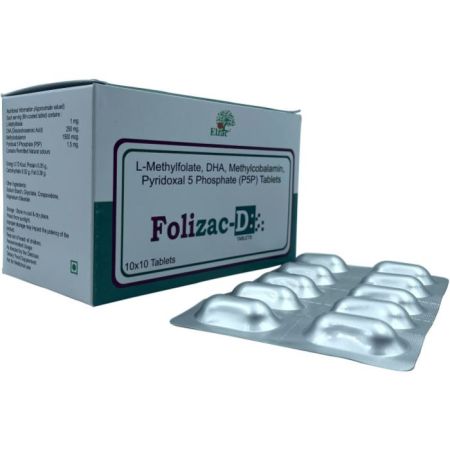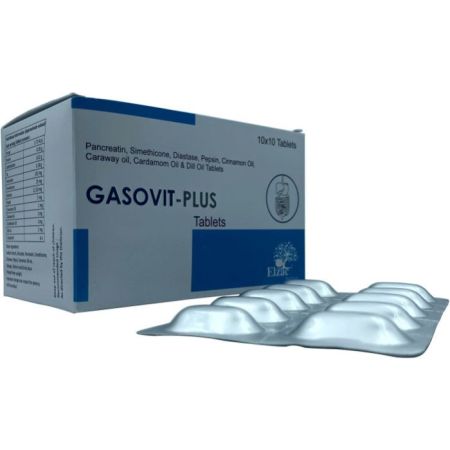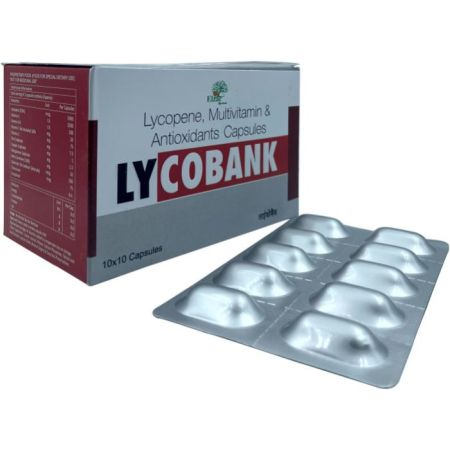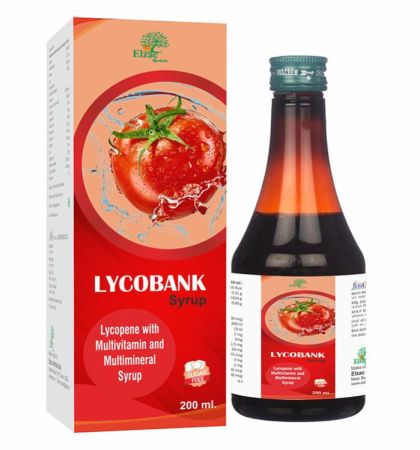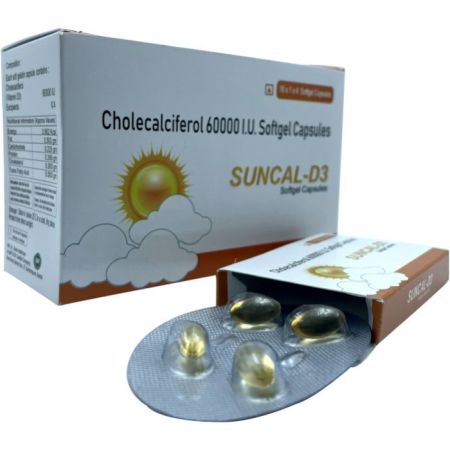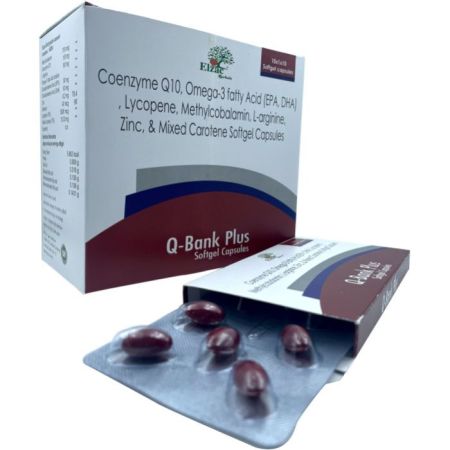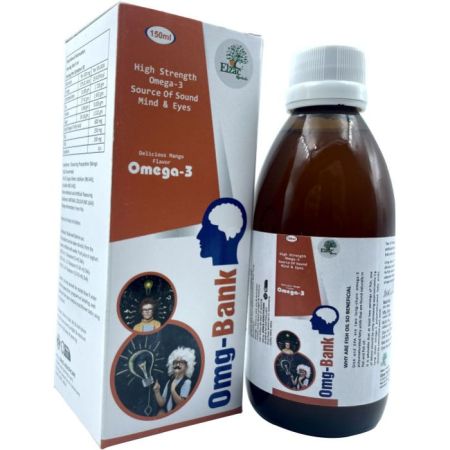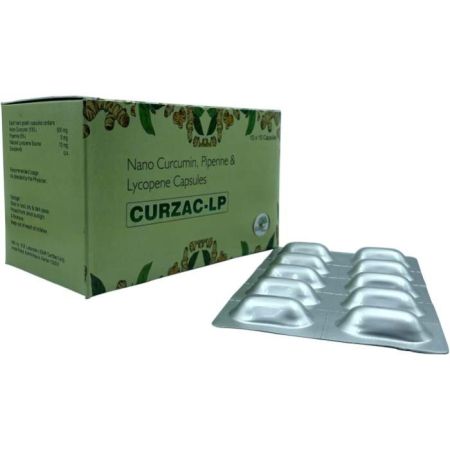



Q-Bank Plus soft gel capsules - Coenzyme Q10, Cyanocobalamin, L-Arginine, Omega-3 Fatty Acid, EPA, DHA, Zinc, Selenium, Lycopene, Mixed Carotene | 10x1x10
Coenzyme Q10 100 mg, Cyanocobalamin 2.2 mcg, L-Arginine 100 mg, Omega-3 Fatty Acid cantains Eicosapentaenoic Acid (EPA) 90 mg, Docosahexaenoic Acid (DHA) 60 mg, Zinc 8.2 mg, Selenium 40 mcg, Lycopene (10%) 5000 mcg, Mixed Carotene (10%) 10.33 mg etc
₹5,300.00 ₹5,500


Add Faq
Q bank softgel capsules 10*1*10
Ingredients
Coenzyme Q10 100 mg, Cyanocobalamin 2.2 mcg, L-Arginine 100 mg, Omega-3 Fatty Acid cantains Eicosapentaenoic Acid (EPA) 90 mg, Docosahexaenoic Acid (DHA) 60 mg, Zinc 8.2 mg, Selenium 40 mcg, Lycopene (10%) 5000 mcg, Mixed Carotene (10%) 10.33 mg etc
Indications:
- Heart health
- Brain health
- Fertility
- Skin health
- Eye health
- Immune function
Key Benefits:
Enhances Energy Production: Coenzyme Q10, a vital component of cellular energy production, helps your cells generate ATP, the body's primary energy source.
Promotes Heart Health: Omega-3 fatty acids, including EPA and DHA, support cardiovascular health by maintaining healthy blood pressure, triglyceride levels, and cholesterol levels.
Boosts Cognitive Function: Cyanocobalamin (Vitamin B12) plays a crucial role in maintaining healthy brain function, memory, and cognitive performance.
Supports Immune System: Zinc and Selenium, essential antioxidants, contribute to a robust immune system, protecting against oxidative stress and free radical damage.
Enhances Skin Health: Lycopene, a potent antioxidant, helps protect skin cells from sun damage and may promote healthy skin aging.
Promotes Eye Health: Mixed Carotene, a source of Vitamin A, supports healthy vision and may help protect against age-related macular degeneration.
Coenzyme Q10:
Coenzyme Q10, also known as CoQ10, is a natural substance found in every cell of the body. It plays a crucial role in the production of energy within cells and acts as an antioxidant to protect cells from damage. Here are some of the potential benefits of coenzyme Q10:
- Supports heart health: CoQ10 may help support heart health by improving heart function and reducing the risk of heart disease. It is often recommended for people with heart failure, high blood pressure, or other heart-related conditions.
- Boosts energy: CoQ10 plays a crucial role in the production of energy within cells. It may help improve exercise performance and reduce fatigue, especially in people with low levels of CoQ10.
- Acts as an antioxidant: CoQ10 is a powerful antioxidant that helps protect cells from damage caused by harmful molecules known as free radicals. This can help slow down the aging process and reduce the risk of chronic diseases.
- Supports brain health: CoQ10 may help support brain health by reducing oxidative stress and inflammation. It may also help improve symptoms in people with neurodegenerative diseases such as Parkinson's and Alzheimer's.
- Improves fertility: CoQ10 may help improve fertility in both men and women. It has been shown to improve sperm quality and motility in men and support the development of healthy eggs in women.
- Supports skin health: CoQ10 may help support skin health by reducing oxidative stress and inflammation, which can contribute to aging and skin damage.
Vitamin B12 (Cyanocobalamin)
Cyanocobalamin is a synthetic form of vitamin B12, a water-soluble vitamin that plays a crucial role in various bodily functions. Here are some benefits and sources of cyanocobalamin:
- Red Blood Cell Formation: Vitamin B12, including cyanocobalamin, is essential for the production of red blood cells. It helps in preventing a type of anemia called megaloblastic anemia, which is characterized by the production of large, immature red blood cells.
- Nervous System Health: Vitamin B12 is vital for the health of the nervous system. It is involved in the synthesis of myelin, a protective covering for nerves. Deficiency can lead to neurological symptoms such as tingling, numbness, and difficulty walking.
- DNA Synthesis: Vitamin B12 is necessary for DNA synthesis and cell division. It plays a role in maintaining the integrity of genetic material.
- Energy Metabolism: Vitamin B12 is involved in the metabolism of carbohydrates, fats, and proteins, contributing to the production of energy.
- Heart Health: Adequate levels of vitamin B12 are associated with a lower risk of cardiovascular diseases. It helps in reducing homocysteine levels, a compound linked to heart disease.
- Cognitive Function: There is some evidence suggesting that maintaining sufficient vitamin B12 levels may support cognitive function and reduce the risk of cognitive decline in older adults.
Overall, Cyanocobalamin is an essential nutrient that is needed for many functions in the body. It is found primarily in animal-based foods such as meat, fish, poultry, eggs, fortified cereals and dairy products, and can also be taken as a supplement.
L-Arginine:
L-arginine is an amino acid that is produced naturally by the body and is also found in many foods. Here are some of the potential benefits of L-arginine:
- Helps with blood flow: L-arginine is a precursor to nitric oxide, a molecule that helps to relax blood vessels and improve blood flow. This can help to reduce blood pressure and improve circulation.
- Supports immune function: L-arginine plays a role in immune function and can help to support the body's defenses against infection and disease.
- Promotes wound healing: L-arginine is involved in the formation of collagen, a protein that is essential for wound healing. It may help to speed up the healing of wounds and reduce the risk of infection.
- Supports muscle growth: L-arginine is involved in the synthesis of proteins, which are the building blocks of muscle tissue. It may help to promote muscle growth and improve exercise performance.
- May improve erectile dysfunction: L-arginine has been shown to improve erectile dysfunction in some men, possibly by improving blood flow to the penis.
- Supports heart health: L-arginine may help to reduce the risk of heart disease by improving blood flow and reducing inflammation.
Overall, L-arginine is an important nutrient that plays a role in many functions in the body. It can be found in many foods, including meat, fish, and dairy products, and can also be taken as a supplement.
Omega-3 Fatty Acid:
Omega-3 fatty acids are a type of polyunsaturated fatty acid that is essential for optimal health. Here are some of the potential benefits of omega-3 fatty acids:
- Supports heart health: Omega-3 fatty acids have been shown to reduce the risk of heart disease by lowering triglycerides, reducing inflammation, and improving blood vessel function. They can also help to lower blood pressure and reduce the risk of arrhythmias.
- Supports brain function: Omega-3 fatty acids are important for brain health and may help to improve cognitive function, memory, and mood. They may also reduce the risk of neurodegenerative diseases such as Alzheimer's.
- Reduces inflammation: Omega-3 fatty acids have anti-inflammatory properties and can help to reduce inflammation throughout the body. This can help to reduce the risk of chronic diseases such as arthritis, diabetes, and cancer.
- Supports eye health: Omega-3 fatty acids are important for maintaining healthy vision and may help to reduce the risk of age-related macular degeneration.
- Promotes healthy skin: Omega-3 fatty acids can help to keep skin healthy and may reduce the risk of skin cancer. They may also help to reduce the symptoms of acne, psoriasis, and other skin conditions.
- Supports healthy pregnancy: Omega-3 fatty acids are important for healthy fetal development and may reduce the risk of preterm labor, low birth weight, and postpartum depression.
Overall, omega-3 fatty acids are an important nutrient that plays a crucial role in many aspects of health. They can be found in fatty fish such as salmon and sardines, as well as in supplements.
Zinc:
Zinc is an essential mineral that is involved in many aspects of health. Here are some of the potential benefits of zinc:
- Supports immune function: Zinc is important for a healthy immune system and can help to reduce the risk of infections such as the common cold.
- Promotes wound healing: Zinc is involved in the process of wound healing and may help to reduce the risk of infection and speed up the healing process.
- Supports healthy vision: Zinc is important for maintaining healthy vision and may help to reduce the risk of age-related macular degeneration.
- Promotes healthy skin: Zinc is important for healthy skin and may help to reduce the symptoms of acne, eczema, and other skin conditions.
- Supports reproductive health: Zinc is important for reproductive health and may help to improve fertility in both men and women. It may also help to reduce the risk of complications during pregnancy.
- Supports brain function: Zinc is important for brain function and may help to improve cognitive function, memory, and mood. It may also help to reduce the risk of neurodegenerative diseases such as Alzheimer's.
- Supports heart health: Zinc may help to reduce the risk of heart disease by improving cholesterol levels and reducing inflammation.
Overall, zinc is an important nutrient that is involved in many aspects of health. It can be found in many foods, including meat, shellfish, nuts, and seeds, and can also be taken as a supplement.
Selenium:
Selenium is an essential mineral that is required in small amounts for optimal health. Here are some of the potential benefits of selenium:
- Supports immune function: Selenium is important for a healthy immune system and can help to reduce the risk of infections.
- Acts as an antioxidant: Selenium has antioxidant properties and can help to protect cells from damage caused by free radicals.
- Promotes healthy thyroid function: Selenium is important for the production of thyroid hormones and can help to reduce the risk of thyroid disorders.
- Supports heart health: Selenium may help to reduce the risk of heart disease by improving cholesterol levels, reducing inflammation, and reducing oxidative stress.
- Reduces the risk of some cancers: Selenium has been shown to reduce the risk of some cancers, including prostate, lung, and colorectal cancer.
- Promotes healthy skin: Selenium is important for healthy skin and may help to reduce the risk of skin cancer.
- Supports fertility: Selenium is important for male fertility and may help to improve sperm quality and motility.
Overall, selenium is an important nutrient that plays a role in many aspects of health. It can be found in many foods, including Brazil nuts, fish, and meat, and can also be taken as a supplement.
Lycopene:
Lycopene is a bright red carotenoid pigment that is found in certain fruits and vegetables, particularly in tomatoes. Here are some of the potential benefits of lycopene:
- Acts as an antioxidant: Lycopene is a potent antioxidant and can help to protect cells from damage caused by free radicals.
- Reduces the risk of some cancers: Lycopene has been shown to reduce the risk of some cancers, particularly prostate cancer. It may also help to reduce the risk of breast, lung, and colon cancer.
- Supports heart health: Lycopene may help to reduce the risk of heart disease by improving cholesterol levels and reducing oxidative stress and inflammation.
- Supports bone health: Lycopene may help to improve bone density and reduce the risk of osteoporosis.
- Supports skin health: Lycopene may help to protect the skin from UV damage and may reduce the risk of sunburn.
- Promotes healthy vision: Lycopene is important for maintaining healthy vision and may help to reduce the risk of age-related macular degeneration.
Overall, lycopene is an important nutrient that plays a role in many aspects of health. It can be found in many foods, including tomatoes, watermelon, and grapefruit, and can also be taken as a supplement.
Mixed Carotene:
Mixed carotenes are a group of naturally occurring pigments found in various fruits and vegetables. They are a type of carotenoid, which is a type of antioxidant that gives plants their bright colors. Here are some of the potential benefits of mixed carotenes:
- Acts as an antioxidant: Mixed carotenes have antioxidant properties and can help to protect cells from damage caused by free radicals.
- Supports immune function: Mixed carotenes are important for a healthy immune system and can help to reduce the risk of infections.
- Supports healthy vision: Mixed carotenes are important for maintaining healthy vision and may help to reduce the risk of age-related macular degeneration.
- Promotes healthy skin: Mixed carotenes may help to protect the skin from UV damage and may reduce the risk of sunburn. They may also help to reduce the risk of skin cancer.
- Reduces the risk of some cancers: Mixed carotenes have been shown to reduce the risk of some cancers, particularly lung cancer.
- Supports heart health: Mixed carotenes may help to reduce the risk of heart disease by improving cholesterol levels and reducing inflammation.
Overall, mixed carotenes are an important group of nutrients that play a role in many aspects of health. They can be found in many foods, including carrots, sweet potatoes, spinach, and kale, and can also be taken as a supplement.
Dosages:
Adults: Take 1 capsule twice daily, preferably after meals.
Children (6-12 years old): Take 1 capsule daily, preferably after meals.
Keywords:
Q-Bank Plus Softgel Capsules, Multivitamin, Dietary Supplement, Health and Wellness, Energy Booster, Coenzyme Q10, Vitamin B12 (Cyanocobalamin), L-Arginine, Omega-3 Fatty Acids (EPA, DHA), Zinc, Selenium, Lycopene, Mixed Carotene, Enhances Energy Production, Improves Heart Health, Boosts Cognitive Function, Strengthens Immune System, Enhances Skin Health, Promotes Eye Health, Supports Overall Well-being, Adults Seeking Overall Health and Wellness, Individuals Concerned with Energy Levels, People Looking to Support Heart Health, Those Seeking Cognitive Function Support, Individuals Aiming to Strengthen Immune System, People Interested in Skin Health Support, Those Seeking Eye Health Support
0 Reviews For this Product

 Q-Bank Plus
Q-Bank Plus 